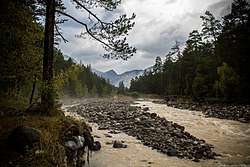Baksan (river)
The Baksan, also known as Azau (Russian: Баксан, Азау) is a river in Kabardino-Balkaria in Russia. It flows east northeast and joins the Malka just before that river joins the northwest bend of the Terek. The Baksan is 169 kilometres (105 mi) long, with a drainage basin of 6,800 square kilometres (2,600 sq mi).[1] The Baksan originates in the glaciers on the south slopes of the Elbrus. Notable tributaries are the Chegem and the Cherek.[1] The towns of Tyrnyauz and Baksan are along the Baksan River, and there is a 25 MW hydropower plant on the river.[2][3] Baksan is also the site of the Baksan Underground Scintillation Telescope (BUST) of the Baksan Neutrino Observatory.[4]
| Baksan | |
|---|---|
 | |
| Location | |
| Country | Kabardino-Balkaria (Russia) |
| Physical characteristics | |
| Source | Mount Elbrus |
| • location | Greater Caucasus |
| Mouth | Malka |
• coordinates | 43.7331°N 44.0633°E |
| Length | 169 km (105 mi) |
| Basin size | 6,800 km2 (2,600 sq mi) |
| Basin features | |
| Progression | Malka→ Terek→ Caspian Sea |
References
- Река Баксан (Азау) in the State Water Register of Russia (Russian)
- "Baksan River" (in Russian). Great Soviet Encyclopedia. Retrieved January 30, 2016.
- "Baksan River Hydro" (in Russian). Baskan HPP. Retrieved January 30, 2016.
- "Baksan Neutrino Observatory" (in Russian). Baskan Neutrino Observatory. Retrieved January 30, 2016.
This article is issued from Wikipedia. The text is licensed under Creative Commons - Attribution - Sharealike. Additional terms may apply for the media files.